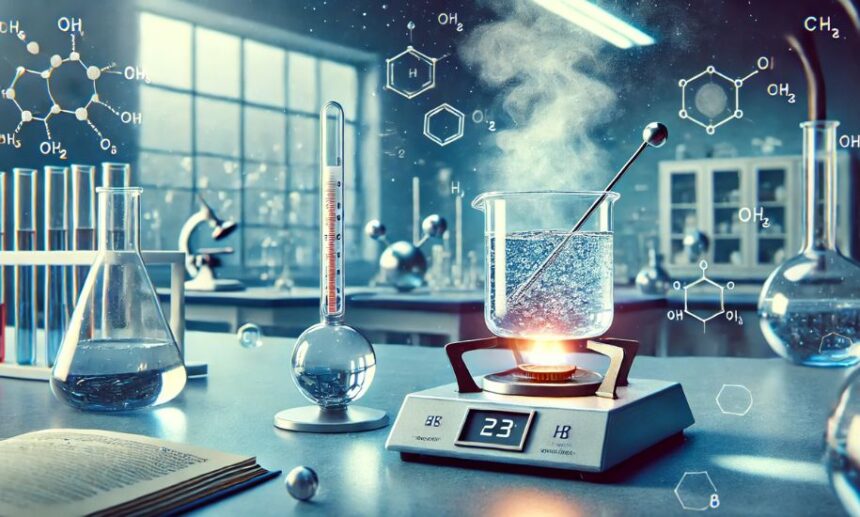Welcome to Physics Heaven, where we dive deep into the fundamental concepts of physics and chemistry. One such important question often asked by students and enthusiasts is, “Is boiling point a physical property?” Understanding the nature of boiling points and their classification as physical or chemical properties is crucial in studying material science, thermodynamics, and chemistry. This article will explore the concept in depth, breaking it down into different sections for a comprehensive understanding.
What is a Boiling Point?
Before answering “Is boiling point a physical property?”, we need to define what a boiling point is. The boiling point of a substance is the temperature at which its vapor pressure equals the atmospheric pressure, causing the liquid to transform into a gas. This phase transition is a key characteristic of matter and varies depending on the substance’s nature and environmental conditions, such as altitude and atmospheric pressure.
For example, water boils at 100°C (212°F) at sea level, but at higher altitudes where atmospheric pressure is lower, it boils at a lower temperature. This variation is crucial in scientific and industrial applications, from cooking to chemical engineering.
Is Boiling Point a Physical Property? The Scientific Explanation
To determine “Is boiling point a physical property?” we must first understand what physical properties are. Physical properties are characteristics of a substance that can be measured or observed without changing its chemical composition. These include:
- Color
- Density
- Melting point
- Boiling point
- Conductivity
- Solubility
Since boiling involves a change in state (from liquid to gas) without altering the chemical composition of the substance, the boiling point is classified as a physical property. When water boils, for instance, it changes into steam (water vapor), but its molecular structure remains H₂O. No new substance is formed in the process.
Why is Boiling Point a Physical Property and Not a Chemical Property?
A chemical property is a characteristic of a substance that describes its ability to undergo a chemical change, forming a new substance. Examples include flammability, oxidation states, and reactivity with acids or bases.
Boiling does not involve a chemical reaction; rather, it is a physical phase change. The molecules gain energy and move apart, transitioning into a gaseous state. However, the molecular identity remains unchanged. This distinction makes boiling point a physical property and not a chemical one.
Factors Affecting the Boiling Point
While answering “Is boiling point a physical property?”, it’s important to discuss the factors that influence the boiling point of a substance:
1. Atmospheric Pressure
The boiling point changes with atmospheric pressure. In high-altitude areas where atmospheric pressure is lower, liquids boil at lower temperatures.
2. Intermolecular Forces
Substances with strong intermolecular forces (such as hydrogen bonding) have higher boiling points. For instance, water has a higher boiling point than ethanol due to stronger hydrogen bonding.
3. Molecular Mass
Generally, larger molecules with greater mass have higher boiling points due to increased van der Waals forces.
4. Purity of the Substance
Impurities can affect the boiling point. For example, adding salt to water raises its boiling point, a phenomenon used in cooking and industrial processes.
Importance of Boiling Point as a Physical Property
Understanding “Is boiling point a physical property?” is important in various scientific and industrial fields. Here are some real-world applications:
1. Distillation Processes
Distillation relies on the differences in boiling points to separate liquids in industries like petroleum refining and alcohol production.
2. Meteorology and Climate Science
The boiling point of water is crucial in weather systems, cloud formation, and predicting evaporation rates.
3. Cooking and Food Science
Adjusting boiling points is essential in culinary techniques such as pressure cooking and baking.
4. Pharmaceutical and Chemical Engineering
Boiling points help determine the stability and purity of chemical compounds used in medicines and industrial chemicals.
Conclusion: Final Answer to “Is Boiling Point a Physical Property?”
In conclusion, yes, boiling point is a physical property. It does not involve any chemical transformation but rather a phase change from liquid to gas. This makes it an essential property in chemistry, physics, and various practical applications. At Physics Heaven, we emphasize understanding such fundamental concepts to build a strong foundation in scientific studies.






